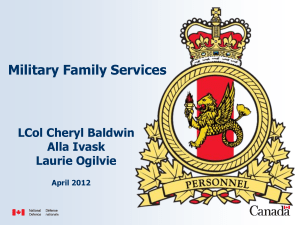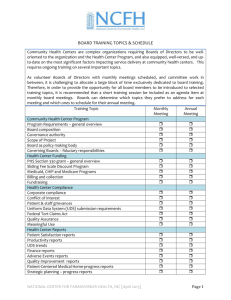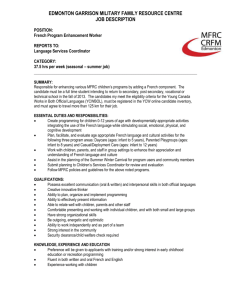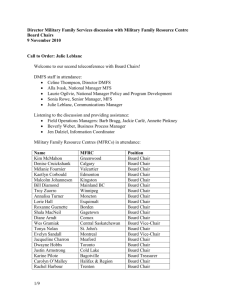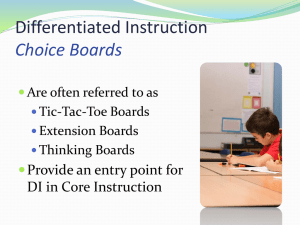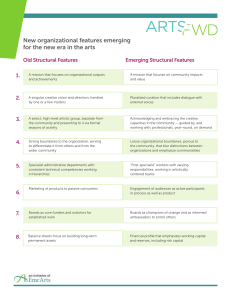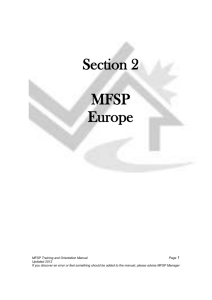National Organization for MFRC Boards of Directors Oct. 2006
advertisement
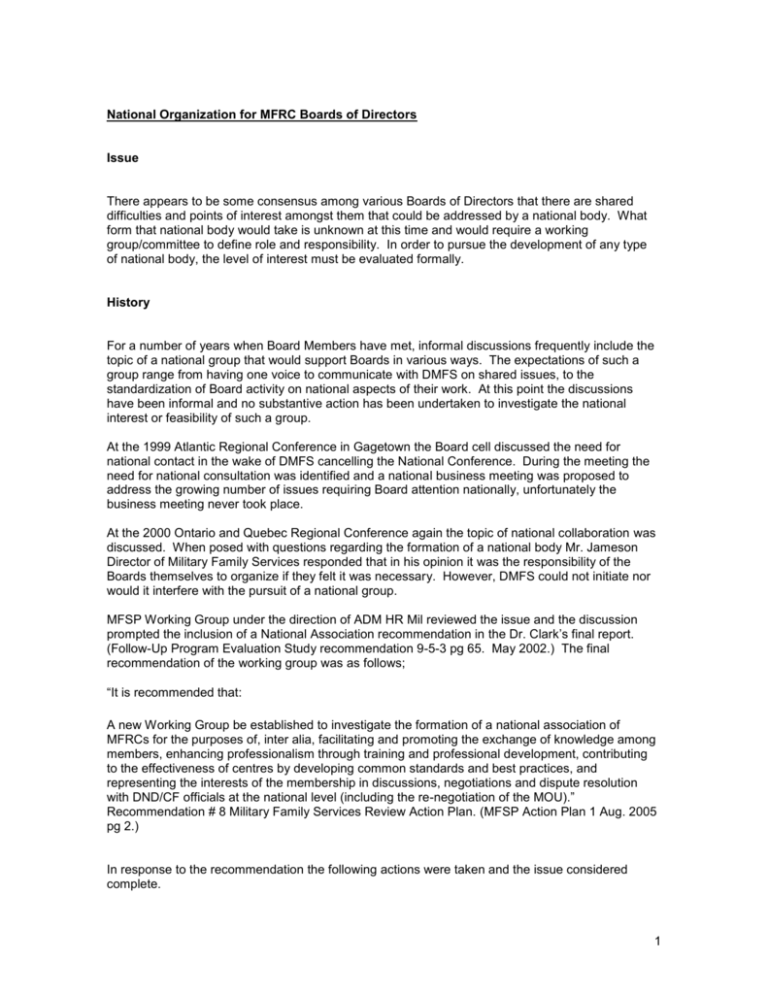
National Organization for MFRC Boards of Directors Issue There appears to be some consensus among various Boards of Directors that there are shared difficulties and points of interest amongst them that could be addressed by a national body. What form that national body would take is unknown at this time and would require a working group/committee to define role and responsibility. In order to pursue the development of any type of national body, the level of interest must be evaluated formally. History For a number of years when Board Members have met, informal discussions frequently include the topic of a national group that would support Boards in various ways. The expectations of such a group range from having one voice to communicate with DMFS on shared issues, to the standardization of Board activity on national aspects of their work. At this point the discussions have been informal and no substantive action has been undertaken to investigate the national interest or feasibility of such a group. At the 1999 Atlantic Regional Conference in Gagetown the Board cell discussed the need for national contact in the wake of DMFS cancelling the National Conference. During the meeting the need for national consultation was identified and a national business meeting was proposed to address the growing number of issues requiring Board attention nationally, unfortunately the business meeting never took place. At the 2000 Ontario and Quebec Regional Conference again the topic of national collaboration was discussed. When posed with questions regarding the formation of a national body Mr. Jameson Director of Military Family Services responded that in his opinion it was the responsibility of the Boards themselves to organize if they felt it was necessary. However, DMFS could not initiate nor would it interfere with the pursuit of a national group. MFSP Working Group under the direction of ADM HR Mil reviewed the issue and the discussion prompted the inclusion of a National Association recommendation in the Dr. Clark’s final report. (Follow-Up Program Evaluation Study recommendation 9-5-3 pg 65. May 2002.) The final recommendation of the working group was as follows; “It is recommended that: A new Working Group be established to investigate the formation of a national association of MFRCs for the purposes of, inter alia, facilitating and promoting the exchange of knowledge among members, enhancing professionalism through training and professional development, contributing to the effectiveness of centres by developing common standards and best practices, and representing the interests of the membership in discussions, negotiations and dispute resolution with DND/CF officials at the national level (including the re-negotiation of the MOU).” Recommendation # 8 Military Family Services Review Action Plan. (MFSP Action Plan 1 Aug. 2005 pg 2.) In response to the recommendation the following actions were taken and the issue considered complete. 1 “It is proposed that the new Working Group will include MFRC representatives. The FSRWG drafted the proposed terms of reference for the new Working Group. Research should be performed in the not-for-profit sector to determine the best way ahead. Obtaining legal input would be advised. This national association should not overlap with the roles and responsibilities of the MFNAB. Considerations need to be given to the C/MFRCs outside of Canada. An FSRWG new recommended initiative. Comments The FSRWG completed its work and handed this initiative over to a volunteer, Mrs. Tracy Douglass t.douglass @ sympatico.ca who will liaise with the C/MFRCs to continue to work this recommendation. Centres are awaiting further direction. MFRC Comox does not support National Association and feels DMFS and Field Operations Managers.” Action Taken Military Family Services Review Action Plan 31 Mar 2003. (MFSP Action Plan 1 Aug. 2005 pg 2.) The outcome of this action is unknown at this time. Recently the Executive Director of the Esquimalt MFRC circulated a document for discussion of this issue at the up coming national ED’s meeting which encompasses many of the same principles discussed in this document. There is no doubt from the number of efforts focused towards a national organization that the concept is appealing but the reason for the failed attempts at pursuing the issue need to be addressed. Discussion The DMFS sponsored conference for Board Members once again gives the opportunity to initiate a dialogue to determine the interest level among MFRC Boards in developing some type of national organization. Of interest would be the possible role a national organization might play within the current MFRC/DMFS organization, this and similar initiatives are reflective of the current level of maturity of MFRC’s. The MFRC/DMFS relationship has improved with the implementation of DMFS Field Operations Managers but is not yet working to its full potential. Communication problems are still evident though not as prevalent as they once were and the need for change aptly identified in Dr. Clark’s Report still exists. However; both DMFS and MFRC’s have grown and matured to the point where the existence of a national organization is possible and desirable. 2 The benefits of a National Board organization may include: DMFS Boards Mechanism for consultation Facilitate consistent communication Mechanism for facilitating change Ability to identify national issues Dispute Mechanism Strengthen the Organization one voice for shared issues Consistency among Centres Sharing information, training, material & experts The ability to support and police themselves Mentoring Address retention problems Mechanism for National Sponsorship Programs, fundraising and National Trusts and Bursary Programs Primarily, a national organization would help create a change in the organization’s culture. There is a long history of lack of trust on both sides of the MFRC/DMFS relationship and the co-operative relationship that a national organization could promote would support a sustainable trusting environment. A great deal of attention has been paid to the professional level of functioning of many Boards of Directors, a national body which could guide and support Boards when required could easily address this problem. A national Board organization would create an atmosphere in which a true partnership between DMFS and the MFRCs could flourish. To increase the professional functioning of all MFRC Boards of Directors to a minimum standard should be a priority. Clearly defining roles and responsibilities for Board Members and education regarding these roles would aid with recruitment and retention. It would also ease a great deal of pressure from DMFS, our funder, in the policing of Boards who are not functioning properly. Boards taking responsibilities for themselves would be sending a positive message regarding our commitment to the community based model. Informally, there have been a number of areas discussed where a national body may be useful: 1 Common issues being dealt with repeatedly in isolation (known as “re-inventing the wheel”) -Common areas of policy -Standards of conduct -Recruitment -Inconsistent dealings with DMFS -Clear, unified voice on issues vs. DMFS -Possibility of mentoring -Network of support always in place National co-operation may lead to decreased volunteer hours for Board members, which in some cases are quite high. 2 Board of Directors Credibility. There appears to be a common belief and perhaps rightly so, that not all Boards are consistently operating in a professional, ethical and legal way. -A national group could outline standards, operational procedures and disciplinary measures to police our selves thus addressing the issue of credibility. -They could support training and development expectations. 3 - Dr. Clark’s May 24/02 report recommendations 7-5-5(pg 41) gives us notice that the current model using Boards of Directors may not be the most efficient approach to programme service delivery and will be reassessed in 4 years. 3 Pooling of Resources, Skills and Influence -The quality of work being done by Boards vary across the country. The communities they serve deserve consistency. -Regions and individuals with in the system could be utilized to draw on skill sets not available across the country -Boards would benefit from a network that could facilitate the sharing of consistent legal, HR, code of ethics and Board policy and structure information. -Currently no mechanism exists to deal with problems with funders (DMFS and individual Bases). A national group could play a role in the development of such a mechanism. -National corporate fundraising possibilities. 4 In the MFSP Final Report May 24/02 Dr Cark identifies some issues that require change. A national group representing MFRC Boards could be beneficial but not limited to these areas: -As already mentioned, reccommendations7-5-5 (pg 39) efficient programme service delivery. -Recommendations 8-1-8 (pg 46) clarification of DMFS and Board roles and responsibilities. -Recommendations 8-25 (pg 56) DMFS new regional management model. The any national body could work well along side the already implemented DMFS Field Operations Managers frame work. Next Steps The way ahead should include the establishment of a working group to assess the role a national organization should play followed by the development of Terms of Reference required to meet the group’s objectives. The Trenton MFRC Board of Directors commits to hosting a national meeting of MFRC Board Chairs and representatives from DMFS in order to determine constructive options for the way ahead. For Success The national organization would need to function with the support of, and in co-operation with DMFS, but not under DMFS direction, autonomy would be essential. . My proposal is that Boards, EDs and DMFS all work together to explore the issue respecting the principle that DMFS can not initiate any such initiative and that the responsibility sits with the Boards. That being said, cooperation in developing a productive efficient national organization is essential to ensuring a positive relationship between any national organization and DMFS. Anything less would negatively impact CF families. Tammy Kleinschmidt Trenton MFRC Board Chair Feb 16, 2007 peter.tamara.kleinschmidt@sympatico.ca 4
